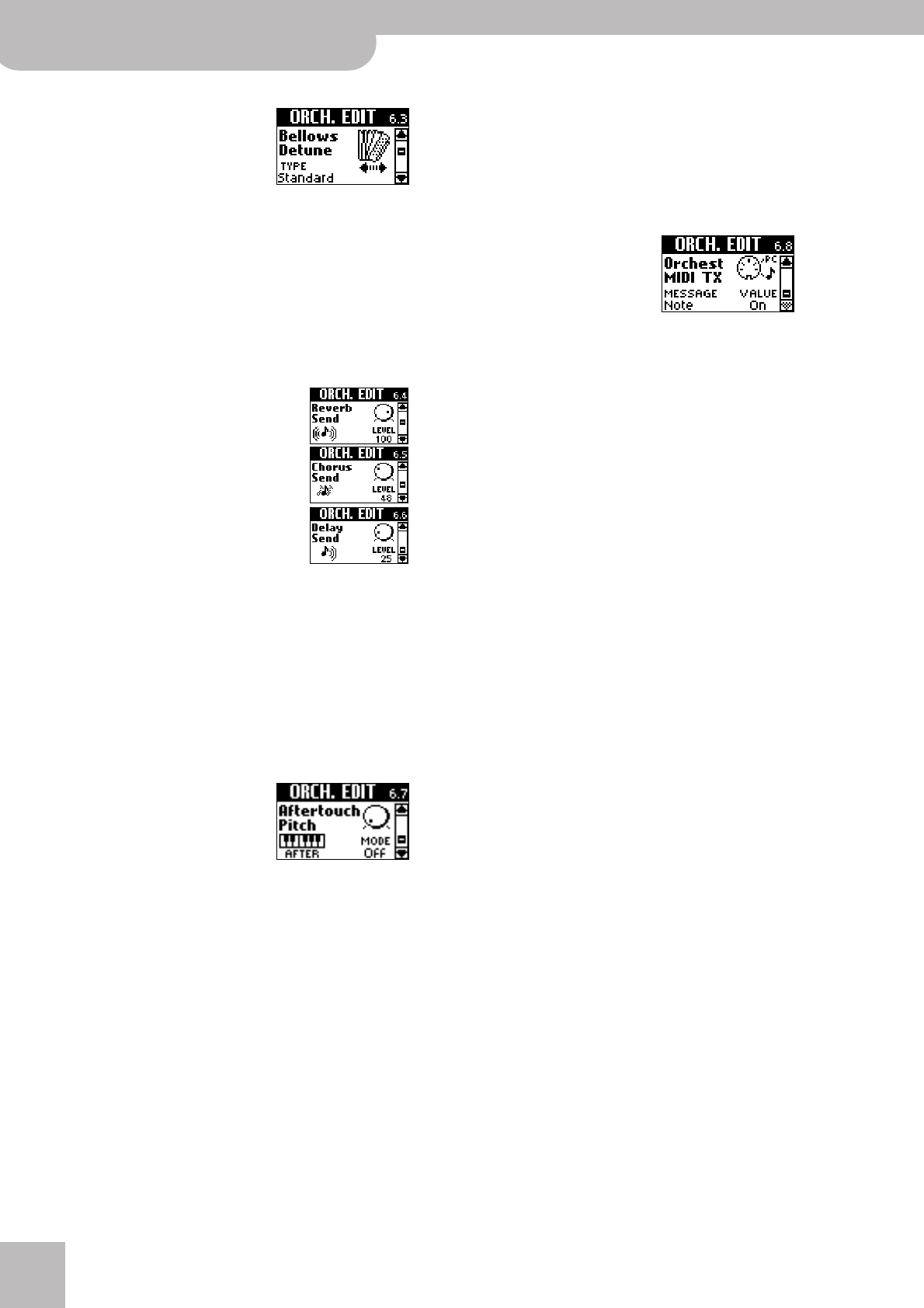
Editing sounds | 6. ORCH. EDIT parameters
58
r
FR-7/FR-5 V-Accordion
6.3 Bellows Detune
(Off, Low, Standard, High,
Default setting: Standard) This
parameter allows you to specify
how strongly the orchestral
sound’s pitch should be influ-
enced by opening and closing the bellows faster than
usual. This may further add to the realism of sounds like
1A~4B, 6A, 6B and 10~12.
If the “Standard” setting seems too mild, try “High”. If it
is too strong, use “Low”. If you do not want any detun-
ing effect, select “Off”. The most convincing setting
usually depends on the selected sound.
6.4 Reverb Send, 6.5 Chorus Send,
6.6 Delay Send
(0~127 for all three) Use these
parameters to set the Reverb, Chorus
or Delay send level (how much effect
should be applied to the Orchestra
section). The higher the value you set,
the more the Orchestra section will be
processed by the effect in question.
It works much the same way as a
cathedral: the louder you sing, the
more reverb (chorus or delay) you
hear. In the case of the cathedral, singing louder means
that you increase the effect send level, i.e. the level of
the signal (your voice) that will be processed by the
acoustic environment.
The other sections (Bass, Free Bass, etc.) have the same
parameters, so that you can create a sound image with
various “levels” (foreground, background).
The effects themselves can be edited on separate pages
(see p. 64).
6.7 Aftertouch Pitch
(Off, 1/4 Down, 1/2 Down, 1/4
Up, 1/2 Up, Default setting: Off)
The FR-7/FR-5’s Treble keyboard
generates aftertouch messages.
“Aftertouch” refers to the fact
that you press a key even further down after playing a
note. This effect allows you to bend the pitch down
(temporarily lower the note) by a quarter (“1/4 Down”)
or a semi-tone (“1/2 Down”). Select “1/4 Up” or “1/2 Up”
to bend the notes up a quarter or a semi-tone. Select
“Off” to switch off the Orchestra section’s aftertouch
recognition.
The Treble section also contains this parameter. You are
thus free to decide whether both the accordion and the
orchestral sounds should be affected by aftertouch
messages or only one of them.
Note: This aftertouch effect applies to all orchestral notes that
are sounding simultaneously. If you play a chord and then only
press down one key of the chord’s constituent notes, all notes are
bent by the same amount. (MIDI buffs call this “channel after-
touch”.)
Note: For organ sounds (8A PercOrgan, 8B JazzOrgan,
9A RotOrgan and 9B Trem Org), aftertouch allows you to alter-
nate between the fast and slow speeds of the Rotary effect. (That
effect is automatically assigned to an organ sound when you
select it.) The speed switching function cannot be deactivated.
You can, however, also add pitch control to this switching func-
tion, and so control two functions via the aftertouch.
6.8 Orchestra MIDI TX
This page contains a series of
MIDI parameters for the Orches-
tra section you need to set one
by one. See page 86 for details
about the MIDI parameters.
These parameters are saved along with all other Set
parameters, which allows you to use different MIDI set-
tings for each Set.


















